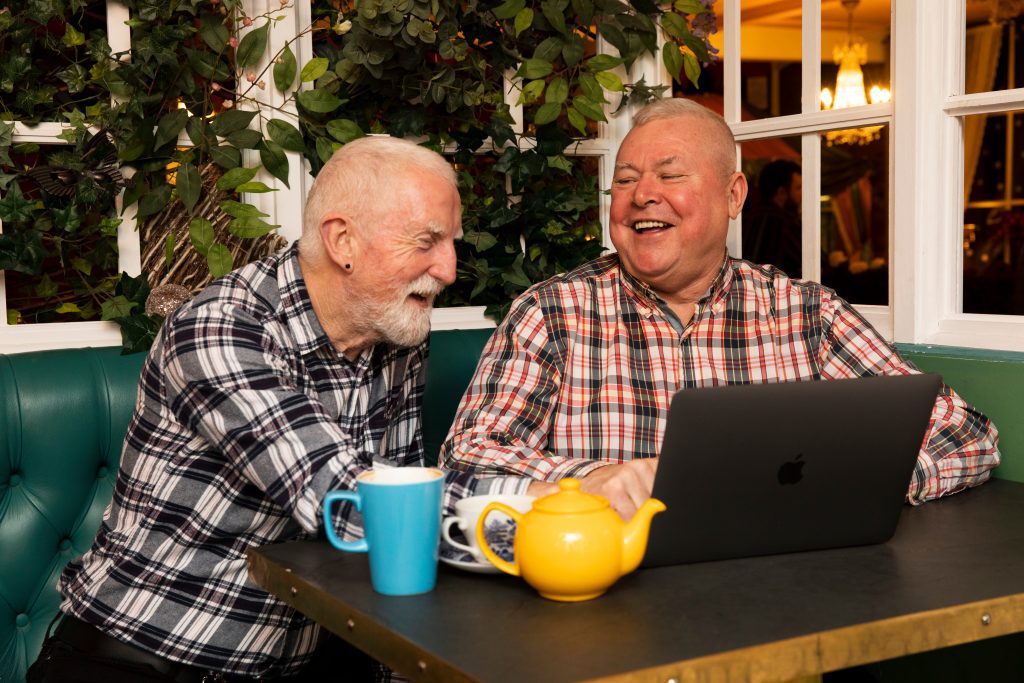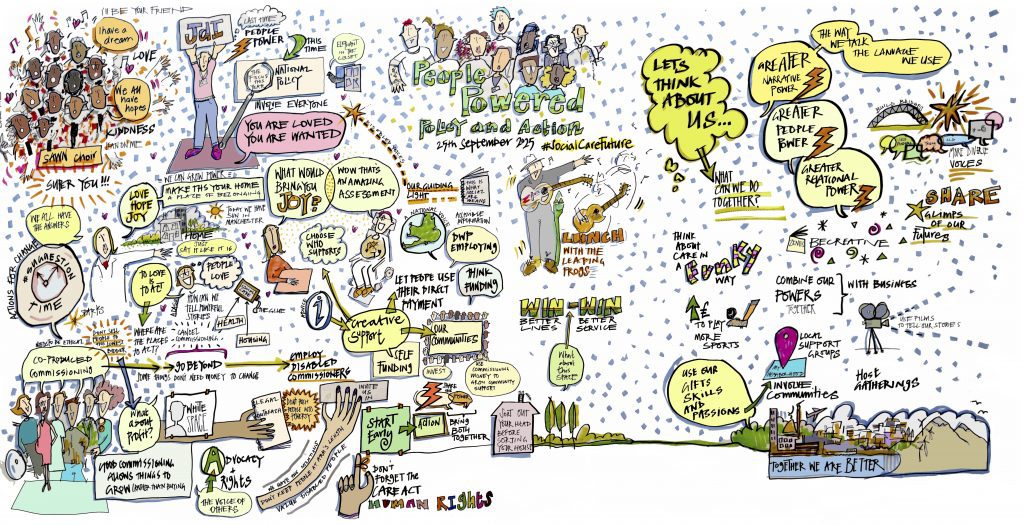By Neil Crowther
#SocialCareFuture, which I co-convene, sits at the confluence of various tributaries of thinking and practice, uniquely drawn together in a movement focused on a specific question: how to sustainably advance the rights, life opportunities and wellbeing of people who have cause to draw on support to live their lives, for reasons related to disability or long-term health conditions.
Given demographic change and decades of successive government failure to ‘grasp the nettle’ on social care funding reform, it’s a key challenge of our age. But in our view, the wrong questions are too often being asked, and as a result the wrong solutions are being explored.
Our starting point is encapsulated by the point disability activist Gavin Croft made to then Care Minister Ivan Lewis 20 years ago when he said ‘I want a life, Minister, not a service’. This position was echoed more recently by the influential reformer Hilary Cottam (2021) who argued in her lecture ‘A Radical New Vision for Social Care’ that ‘at a profound level improving wellbeing is not about the design of a great social care system that patches up the gaps where real life should be. It is about turning this thinking on its head. We must think first how to create the conditions for good lives.’ Our wellbeing is not something that can be delivered to us, but rests in being able to pursue the life we have reason to value and the function of adult social care is to help us to achieve our own ‘gloriously ordinary life’. This echoes and amplifies the ideas of the disabled people’s independent living movement, the inclusion movement and wider thinking, such as that spearheaded by Tom Kitwood concerning care and support for people living with dementia. We all want to live in the place we call home, with the people and things that we love, connected to others and doing the things that matter to us because these are the foundations of all our wellbeing.
But how can we possibly afford to pursue this vision for the lives of people who have reason to draw on social care where public services, including local government, are so starved of funding? This is where other tributaries of established and emerging thought and practice start to flow together.
In our view, it’s precisely by starting with each unique person and a blank piece of paper about how their life goals might be met that offers the chance to think much more creatively and resourcefully about the opportunities, relationships and resources that could help people to achieve them, including those that cannot be ‘procured’ or counted or regulated. Or as Martin Walker put it in his recent blogpost about his mum’s life ‘we need to commission and organise care around what matters to people. That means valuing relationships, investing in flexible support, and joining the dots between services and community life.’ There a many approaches which strive to achieve this, outlined on the ‘glimpses of the future’ page of our website: things like self directed support, community circles, local area coordination, micro enterprises, family group conferencing, small supports, community led support, Keyring networks, Wellbeing Teams and shared lives for example. These proactive, relational approaches to support all blend and connect formal and informal resources and relationships, offering a far greater wellbeing dividend than the ‘sheep-dip’ by-the-minute time and task, life and limb homecare or antiquated institutional care on which so much public money is squandered.
For example, analysis has found that by improving wellbeing scores from an average of 2.6 to 8.30 out of 10, the ‘small supports’ approach in Plymouth generated an economic value of £768,612 for nine people in just one year, delivering savings of £228,816 to adult social care, and £950,159 to wider public services.
In Hartlepool, where the council has introduced a community led support approach, the council is reporting very significant impacts, including fewer people requiring formal support following a ‘good conversation’ rather than a traditional assessment, reduction in requests for long term support, in occupation therapy and other waiting lists across adult social care.
Internal City of York research estimates their Local Area Coordination work supported £6.8 million of costs prevented in 2023 (£4.9 million of which would have been attributable to adult social care).
Hertfordshire County Council has successfully adapted and promoted direct payments and individual service funds, supporting people to draw on the range of local community micro enterprises. In some areas, the micros offering care and support at home can be between £4 and £10 per hour less expensive than commissioned homecare, while offering greater outcomes.
Despite this potential, the organisations advancing these approaches all often find themselves swimming against strong, hostile currents. As James Plunkett has noted:
‘Today’s problems seem complex because they arise from the hidden order – or disorder – of living systems. This makes them hard for our governing institutions to work with, and even to see. Our public institutions also struggle to see solutions to these problems, since solutions are often to be found in the same hidden material. A friendship that helps someone live joyfully despite painful arthritis; a community project that fosters dignity and agency; a city that proves resilient – like an ecosystem – because of its messy diversity. The problem isn’t that our old ‘how’ of government overlooks these hidden capacities and wastes them. The problem is that our old ‘how’ is so blind to these capacities that it actively severs or depletes them, often even when we think we are helping.’
This is why #SocialCareFuture engages with, convenes and connects wider ideas and thinking around public service reform which both start with the individual person and their intrinsic motivations and which unlock abundance, whether untapped resources, untapped creativity or the untapped opportunities that come from connecting hitherto disconnected things.
Recently we’ve been excited by the work previously led by Mark Smith in Gateshead called ‘the liberated method’, which shares much in common with the principles and approaches outlined in our ‘glimpses of the future’, especially Local Area Coordination. Having long advocated place and asset-based approaches to commissioning and community development, we’re excited to see renewed interest in ‘Total Place’ which aimed to understand how places could make better use of all local resources to achieve outcomes for local people by breaking down silos among local government and its partners in the public, private and voluntary and community sectors. We have worked closely, via the Time to Act Reform Group, with colleagues in local government to explore opportunities for early action and prevention, reducing pressures on acute health and care services. We were early supporters of the Kings Fund-led initiative #DoWith, a network of people and organisations calling for a radical shift in the public sector from ‘doing to’ to ‘doing with’. We also very much welcome the Cabinet Office ‘Test, Learn and Grow’ approach, testing solutions directly in local areas with communities and workers who know best and the government’s principles for public service reform, centred in integrating services around people’s lives, on prevention and on devolution and co-production.
We need more public resources brought to the table in support of people with reason to draw on care and support, but they also need to be far better used than today. We hope that the Casey Commission, in its consideration of long-term reform, will nest its thinking in these wider developments in thinking and practice, and that those leading these wider developments will actively engage with the question of social care reform, which for too long has centred only on how to raise the funding to pay for social care and not on what how money should be best invested.
In sum, a sustainable #SocialCareFuture involves, in our view, focusing on wellbeing, starting with the uniqueness of each individual person, unleashing creativity and harnessing abundance. As our movement has shown, it is so often the thought leadership of people who draw on social care to live their lives that presents the best framework for action, so I’ll finish this post by sharing the recommendations of the ‘Whose social care future is it anyway’ commission, supported by #SocialCareFuture in 2021:
Communities where everyone belongs
We want to be part of our communities, helped where we need it to connect to people and things that give our lives meaning and purpose – relationships, friends, family, work, leisure – and to share our gifts and talents
Social care must help remove barriers and offer assistance beyond traditional services to support such an ordinary community life
This means helping us to access the places and things in our communities everyone else can use
And it means offering support that is usually not about a “service solution” but that helps us connect in ways that others do, through shared interests, contributions and concerns in our communities
Leading the lives we want to lead
People must be trusted to make decisions and direct their own support, with help where they need and want it
Practices, systems, processes and rules that mainly control people must be removed and instead enable lots of creativity, innovation and flexibility
This choice and control must apply to all forms of support – including personal budgets, support at home, housing with support
When we choose to manage our own support we should be really free and supported to do just that. Councils should focus on the resources and support needed to make this work well, not restrictive rules and controls that limit our lives or make it too much of a burden.
More resources, better used
Government resources must be increased to the level that allows people the funding they need to live a life like other people, where needed supported by staff who are properly paid and supported themselves
Leaving people without the money they need for a life like others, through excessive local charges, must stop
Local councils, their partners and support providers must think about and use resources differently – starting from asking how to support good lives in strong communities not traditional services
All kinds of local resources should be used, not just social care money
Money should be redirected to better, non-traditional kinds of support that help people find their own solutions in their communities, avoiding needing services where possible or being supported through ways that work for them
Sharing power as equals
Real co-production must happen at all levels; individual, service, strategic
All unnecessary rules and bureaucracy that control rather than enable people must go
Workers, properly rewarded, must be given the chance to use their creativity, skills and judgement in proper partnership with people
The way councils arrange and buy services (commissioning) must become collaborative with communities – ‘co-commissioning’
Leaders must make generating a culture of openness and trust one of their highest priorities
We need stronger assurance, accountability and forms of redress and appeal



